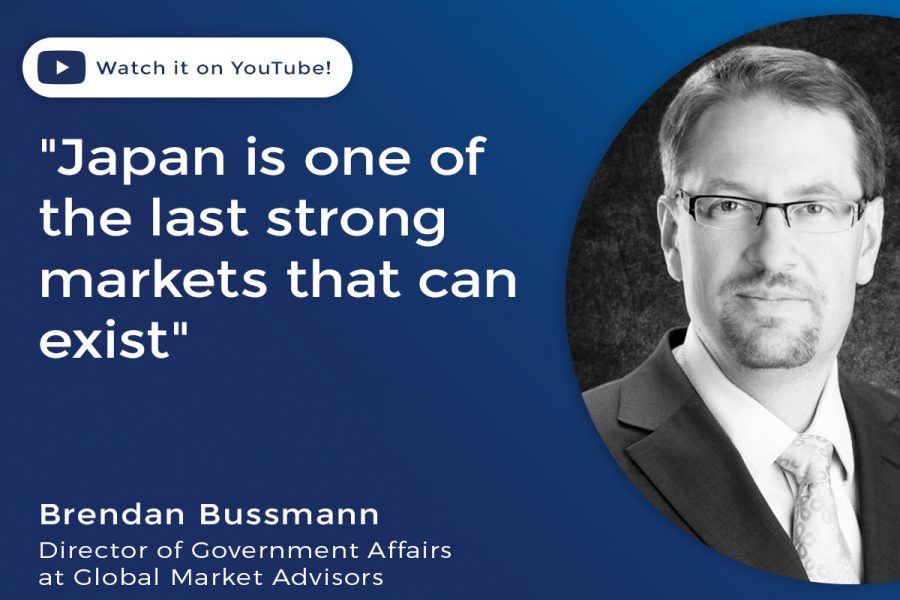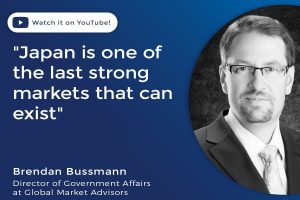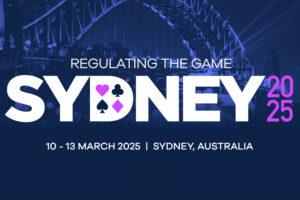Brendan Bussmann: “Japan is one of the last strong markets that can exist”

Exclusive interview.- Brendan Bussmann, partner and director of government affairs at Global Market Advisors, shares his views on the future of gaming in Asia and Las Vegas’s bounce back from Covid-19.
In Las Vegas, things are starting to look up. Summer is in sight and casinos are looking forward to getting back to full capacity from June.
Speaking from the US’s gaming capital, Brendan Bussmann, partner and director of government affairs at Global Market Advisors,offered Focus Gaming News his outlook for the near future in casino gaming, both in the US and over in Asia where he has extensive experience in the sector.
“The path forward for Las Vegas is looking good”
Encouraged by the numbers from March and the increase in capacity limits, casinos in Las Vegas are starting to see the light at the end of the pandemic.
“I think people are cautiously optimistic,” Bussmann says. “Obviously, we know that bumps, as we’ve seen in other parts of the world, can occur still and have setbacks, but I think that based off the March gaming revenue numbers it shows the resiliency of Vegas and people’s desire to come back, enjoy fun and get back out.”
Bussmann praised casino operators for being strong and proactive on implementing health and safety protocols and for quickly drawing up a path forward. He expects some of the new measures will remain in place for some time, perhaps permanently, but says Vegas is looking forward to seeing the return of business and, eventually, foreign visitors.
“The third and fourth quarter and heading into 2022 looks very strong to get that business customer back here. And then hopefully down the road, we’ll start being able to accept international guests as well.”
Japan as an untapped gaming market
One of the things Bussmann is most looking forward to once the Covid-19 pandemic is under control is to be able to get back out to Asia. He’s encouraged by developments in Japan and is optimistic about the country’s future casino market.
“I still hold true that I think Japan is one of the last strong markets that can exist. Partially, that stems from that it’s a virtually untapped market in Asia. While the Japanese have other amenities in the area, Korea being the closest out of all of those, it’s really an untapped gaming market that has huge potential, if done correctly.
“It’s also one of those where the regulatory structure is safe enough to be able to do business, that operators aren’t walking into situations where they may risk a licence somewhere else or it may not be a stable environment.”
He noted that Japan continues to be set back by the pandemic and that there are still some regulatory questions but expects the process to move forward with four cities now clear competitors for the three IR licences that will be up for grabs.
“There’s some things [in Japan’s casino regulations] that I think they still need to amend to make it a better market. But one thing that continually is apparent is that the tax rate is not necessarily going to change. It’s going to be set where it’s at.
“But how you calculate GGR, where promotions may or may not come into play, those types of things are all important. How you count casino space, which is obviously very important. We first saw that in Singapore with the 15 thousand square metre limit. How are you counting that three per cent threshold? And what is it based off?”
He noted that with Japan not having a casino gaming market yet, another challenge would be the creation of player protection frameworks effectively from scratch.
“Obviously, there’s a deep concern for responsible gaming measures and currently with the existing gaming product, not just with the racing, but also what you see with pachinko and pachislot, is that those provisions really aren’t in place.
“Any operator going into that market is basically going to have to, from the ground up, create that structure in partnership with not just the local prefectures, but the national government and the CRC to develop that infrastructure for that small percentage of people that do have a problem, and make sure those resources are available accordingly.”
The rise and coming to maturity of the Philippines’ POGOS
Another consequence of the pandemic, Bussmann says, has been that it provided the Philippines with a chance to get on top of its offshore online casino operators, known as POGOs.
“One of the challenges you had with POGO’s, they rose so quickly, so fast that the regulatory structure basically had to catch up with them,” he says. “And the pandemic actually provided the regulator that opportunity to say, hey, time out, guys.”
“Any operator that is looking to get around an unregulated market is probably going to feel that hammer coming down from Beijing.”
Brendan Bussmann, director of government affairs at Global Market Advisors.
The government has streamlined AML laws, and it’s looking at enforcing new taxation regimes. Despite reports of a POGO exodus as a result of this and the lack of workers due to travel restrictions amid the pandemic, Bussmann expects the POGO sector to continue in the Philippines, but reduced to the more serious players.
“You’re probably going to see fewer operators in the market, but more robust and legitimate operators that want to do business in the cleanest way possible.
“Any operator that is looking to get around an unregulated market is probably going to feel that hammer coming down from Beijing.”
And Beijing, he says, is one of the region’s major concerns, and not only in the region. China’s blacklist of gaming destinations, the contents of which have still not been revealed, is a worry for both online and land-based casino operators, Bussmann says.
As for online gaming in Asia, Bussmann expects to see some development in the form of a symbiotic relationship between land-based and online casinos.
He notes that there is now enough protection available online for more countries to consider allowing online gaming, while revenue can supplement, but not supplant, land-based revenue if done properly.
Check out the full interview with Brendan Bussmannon the Focus Gaming News YouTube channel. Don’t forget to subscribe!









